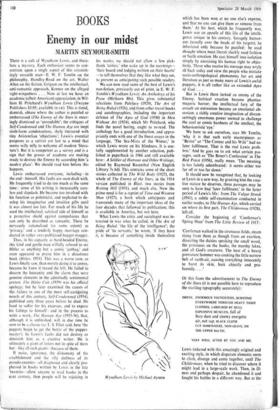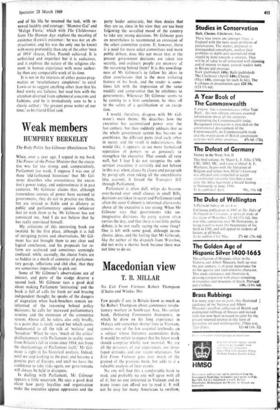Enemy in our midst BOOKS
MARTIN SEYMOUR-SMITH
There is a cult of Wyndham Lewis, and there- fore a mystery. Each enthusiast seems to con- centrate upon a single aspect of this astonish- ingly versatile man—E. W. F. Tomlin on the philosophy, Handley-Read on the art, Walter Allen on the fiction, Grigson on the intellectual, anti-romantic approach, Kenner on the alleged right-wingedness . . . Now at last we have an academic (albeit American) appreciation, in Wil- liam H. Pritchard's Wyndham Lewis (Twayne Publishers $3.95; available in UK). This is timid, donnish, obtuse where the author is puzzled or embarrassed (The Enemy of the Stars is sneer- ingly dismissed as 'unreadable'; the critiques of Self-Condemned and The Human Age are inept sixth-form condensations, shyly tinctured with tiny Aristotelian 'objections'; Lewis's essential purposes as a satirist are lost to a mind that seems willy nilly to welcome all modern 'litera- ture'). But it is competent as a survey and is a sign that the groves of academe are making ready to destroy the Enemy by according him 'a modest place'. We should read him before this happens.
Lewis embarrassed everyone, including—in the end—himself. His faults are soon dealt with. He frequently tried to do too much at the same time: some of his writing is inexcusably care- less and slapdash. He became too involved with his function as polemicist, and neglected to de- velop his imaginative and intuitive gifts until it was almost too late. For much of his life be used the intellectual, satirical side of himself as a protective shield against compulsions that can only be described as romantic. These he nervously rationalised (to some extent) as `privacy,' and a tenderly happy marriage con- ducted in rather over-publicised hugger-mugger.
Thus, in his capacity as hard-headed'Enemy, this kind and gentle man wilfully refused to see Hitler as anything but a comic `gutbag,' and even appeared to praise him in a disastrous book (Hitler, 1931). This was a worse case, as Lewis finally saw, than merely doing it to annoy, because he knew it teased the left. He failed to discern the humanity and the alarm that were genuine elements in the admittedly sentimental protest. The Hitler Cult (1939) was his official apology; but he later examined the causes of this failure in one of the most self-castigating novels of this century, Self-Condemned (1954), published only three years before he died. He lived to suffer for his excesses, and to expose his failings to himself—and in the. process to write a work, The Human Age (1955-56), that, although it is unfinished, will in due time be seen to be a classic (as T. S. Eliot said, here 'the puppets begin to get the better of the puppet- master'). So Lewis's faults did not destroy or diminish him as a creative writer. He is ultimately a giant of letters not in spite of them but—like all such giants—because of them.
If noise, ignorance, the dishonesty of the establishment and the silly dullness of its pseudo-enemies—all diagnosed and clearbi pro- phesied in books written by Lewis in the late 'twenties—allow anyone to read books in The next century, then people will be rejoicing in his works; we should not allow a few pick- thank 'critics,' who wake up in the mornings— `their board and lodging written on their hearts' —to tell themselves that they like what they see, to prevent us anticipating such possible readers.
We can now read some of the best of Lewis's non-fiction, previously out of print, in E. W: F. Tomlin's Wyndham Lewis: An Anthology of his Prose (Methuen 80s). This gives substantial selections from Paleface (1929), The Art of Being Ruled (1926), and from other travel books and autobiographies, including the important defence of The Apes of God (1930) in Men Without Art (1934), which Mr Pritchard, who finds the novel boring, ought to re-read. The anthology has a good introduction, and appro- priately ends with one of the finest essays in the language, 'The Sea-Mists of the Winter,' in which Lewis wrote on his blindness. It is use- fully supplemented by another selection, pub- lished in paperback in 1966 and still available here: A Soldier of Humour and Other Writings, edited by Raymond Rosenthal (New English Library 7s 6d). This contains some of the short stories collected in The Wild Body (1927), the whole of The Enemy of the Stars, in the 1914 version published in Blast, two stories from Rotting Hill (1951), and much else. Now the prime need is for a reprint of Time and Western Man (1927), a book which anticipates and transcends many of the important ideas of the four decades that followed its publication; this is available in America, but not here.
What Lewis the critic and sociologist was in- terested in was what he called, in The Art of Being Ruled, 'the life of the intelligence'; the pride of Its servants,' he wrote, 'if they have it, is because of something inside themselves Wyndham Lewis by Michael Ayrton which has been won, at no one else's expense, and that no one can give them or remove from them.' At his best, which he frequently was, Lewis was an apostle of this life of the intelli- gence unique in his century. Savagely humor- ous (usually over the heads of his targets), he infuriated only because he puzzled: he used thought where most literati slackly used fashion or facile emotion. He cast himself into isolation simply by exercising his human right to objec- tivity. Those who receive his message may wryly sit back today and view the people who mistake socio-anthropological phenomena for art and literature as just so many more of Lewis's awful puppets; it is all rather like an extended Apes of God . . .
• But in Lewis there lurked an enemy of the Enemy. Satirical creation became phantas- magoric horror; the intellectual fury of the assault on extremism became an emotional ob- session; a richly creative imagination of discon- certingly enormous power seemed to challenge the cool or comic hardness of the intellect, the behaviouristic 'eye.'
We have to ask ourselves, says Mr Tomlin, `why it is that such early masterpieces as "Bestre" or "The Cornac and his Wife" had no later fulfilment. That is the real Lewis prob- lem.' And he goes on to ask what certain pas- sages, such as 'The Boxer's Confession' in The Red Priest (1956), really mean. 'The meaning is too faintly adumbrated: it seems either too far off or too far down.'
It should now be recognised that, by looking at Lewis in a new way, by granting him the crea- tive stature he deserves, these passages may be seen to have had 'later fulfilment,' in the latter period of Lewis's life: from The Vulgar Streak (1941), a subtle self-examination conducted in earlier modes, to The Human Age, which carried on where its first part, The Childermass. (1928), left off.
Consider the beginning of 'Cantleman's Spring Mate' from The Little Review of 1917:
'Cantleman walked in the strenuous fields, steam rising from them as though from an exertion, dissecting the daisies specking the small wood, the primroses on the banks, the marshy lakes, and all God's creatures. The heat of a heavy premature Summer was cooking the little narrow belt of earth-air, causing everything innocently to burst its skin, bask abjectly and pro- foundly. . .
Or this from the advertisement to The Enemy of the Stars (it is not possible here to reproduce the startling typography accurately):
DRESS. ENORMOUS YOUNGSTERS,. BURSTING EVERYWHERE THROUGH HEAVY TIGHT CLOTHES, LABOURED BY DULL
EXPLOSIVE MUSCLES, full of fiery dust and sinewy energetic air, not sap. BLACK CLOTH
CUT SOMEWHERE, NOWADAYS, ON THE UPPER BALTIC.
VERY WELL ACTED BY YOU AND ME.
Lewis tinkered with this amazingly original and exciting style, in which disparate elements seem to clash, diverge and come together, until The Childermass, when he tried to discover where it might lead in a large-scale work. Then, in ill- ness and perhaps despair, he abandoned it and fought his battles in a different way. But at the end of his life he resumed the task, with re- newed lucidity and courage: `Monstre Gai' and `Malign Fiesta,' which with The Childermass form The Human Age, explore the meaning of existence (Lewis's existence: he was not an ab- stractionist, and his was the only one he knew) with more profundity than any of the other 'men of 1914' (Joyce, Eliot, Pound) achieved. It is unfinished and imperfect but it is audacious, and it explores the nature of the religious ele- ment in human experience with more author- ity than any comparable work of its time.
It is not in the interests of either panto-prag- matists or 'revolutionary simpletons' to extol Lewis or to suggest anything other than that his final works are failures; but read him with the attention diverted from ephemeral concerns and fashions, and he is immediately seen to be a classic author: 'the greatest prose writer of our time,' as his friend Eliot said.



































 Previous page
Previous page